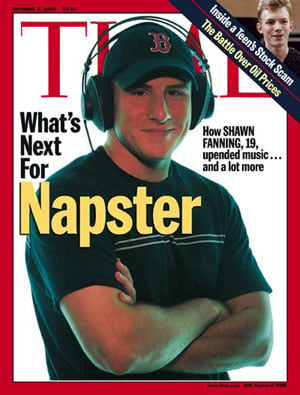Napster was a file-sharing service founded by Shawn Fanning and Sean Parker that operated between June 1999 and July 2001.
It was an innovative project by Fanning to create an independent peer-to-peer file-sharing service. When launched it allowed people to easily share their MP3 files (music) with other participants. It was followed by many other decentralized projects that used Napster's P2P file-sharing example, such as Gnutella, Freenet, BearShare, Soulseek, AudioGalaxy, LimeWire, Scour, Kazaa, and Grokster.
The idea of file-sharing from a decentralized, multi-user locations was a new and important piece of technology.
Napster and other services were shut down by court order for copyright infringement after strong legal actions against them from the record industry.
But why was it called Napster? Shawn Fanning joined a hacker chat to share his ideas and used the handle Napster. That was a name given to him by a junior high school basketball rival because of his nappy hair. In that hacker group, he connected with Parker and they started on the file-sharing network which would be given the nickname.
The reuse of the name has a complicated history. According to Wikipedia, as of this posting:
"Napster's brand and logos were acquired at a bankruptcy auction by Roxio which used them to re-brand the Pressplay music service as Napster 2.0. In September 2008, Napster was purchased by US electronics retailer Best Buy for $121 million. On December 1, 2011, pursuant to a deal with Best Buy, Napster merged with Rhapsody, with Best Buy receiving a minority stake in Rhapsody. On July 14, 2016, Rhapsody phased out the Rhapsody brand in favor of Napster and has since branded its service internationally as Napster and expanded toward other markets by providing music on-demand as a service to other brands like the iHeartRadio app and their All Access music subscription service that provides subscribers with an on-demand music experience as well as premium radio. On August 25, 2020, Napster was sold to virtual reality concert company MelodyVR. On May 10, 2022, Napster was sold to Hivemind and Algorand. The investor consortium also includes ATC Management, BH Digital, G20 Ventures, SkyBridge, RSE Ventures, Arrington Capital, Borderless Capital, and others."




